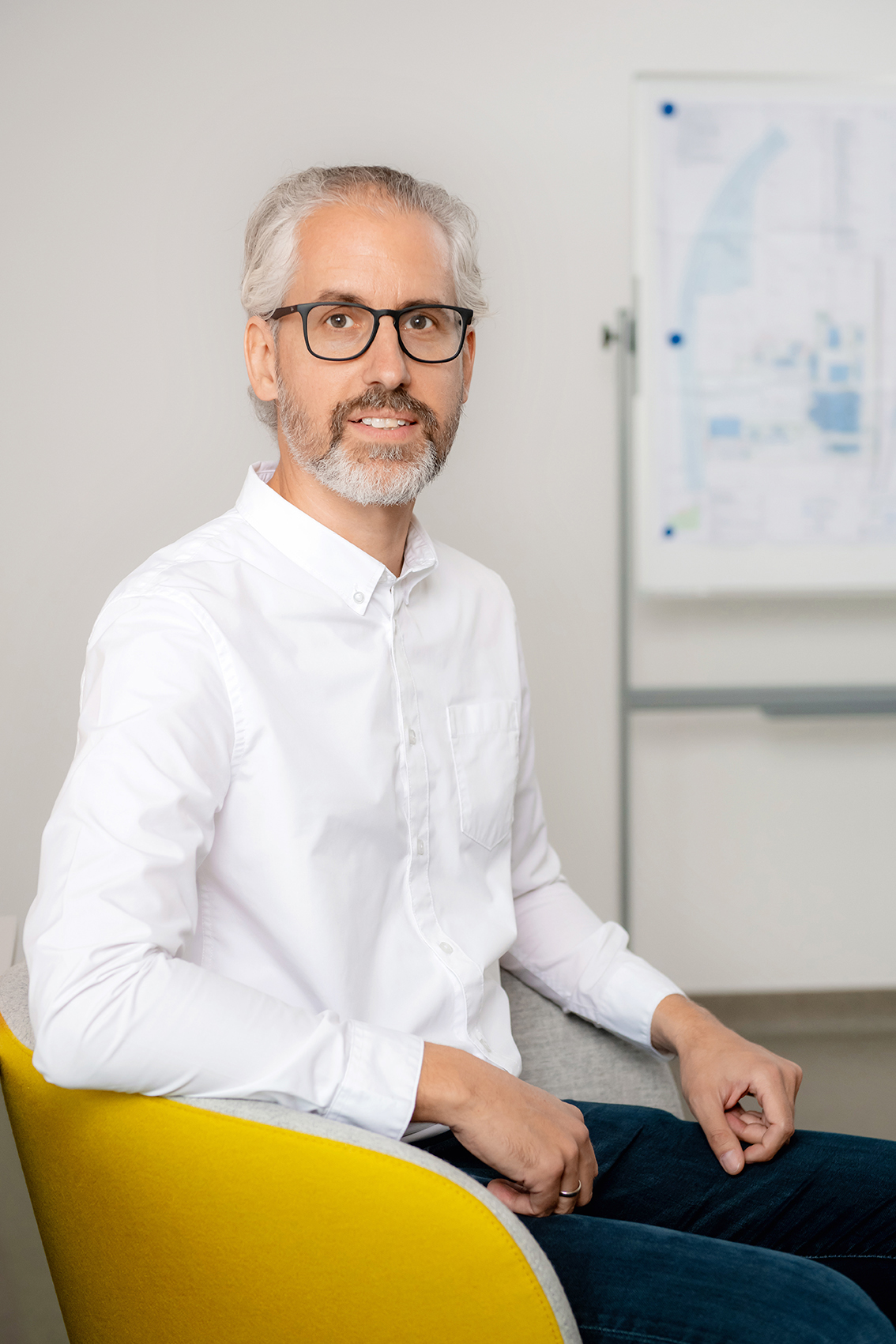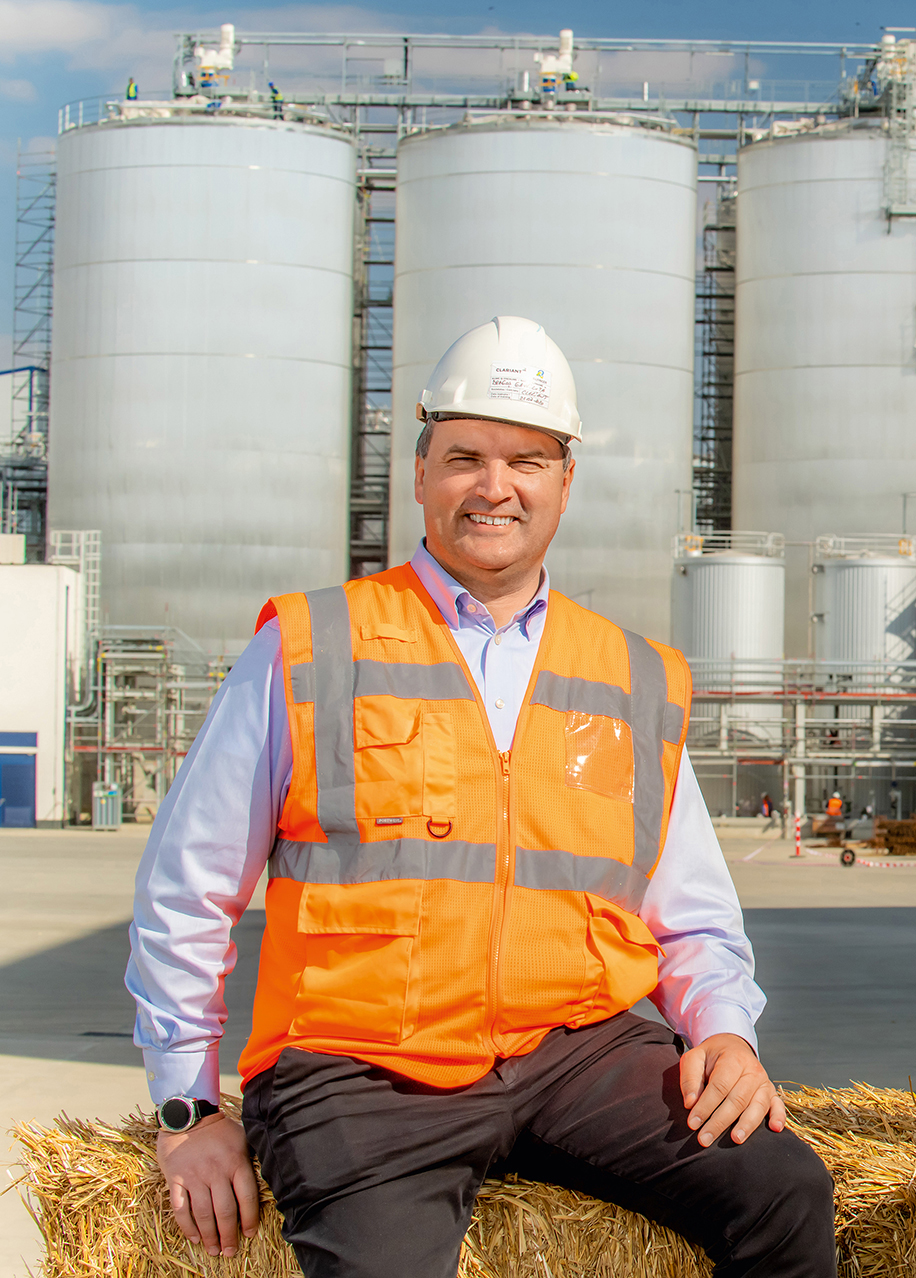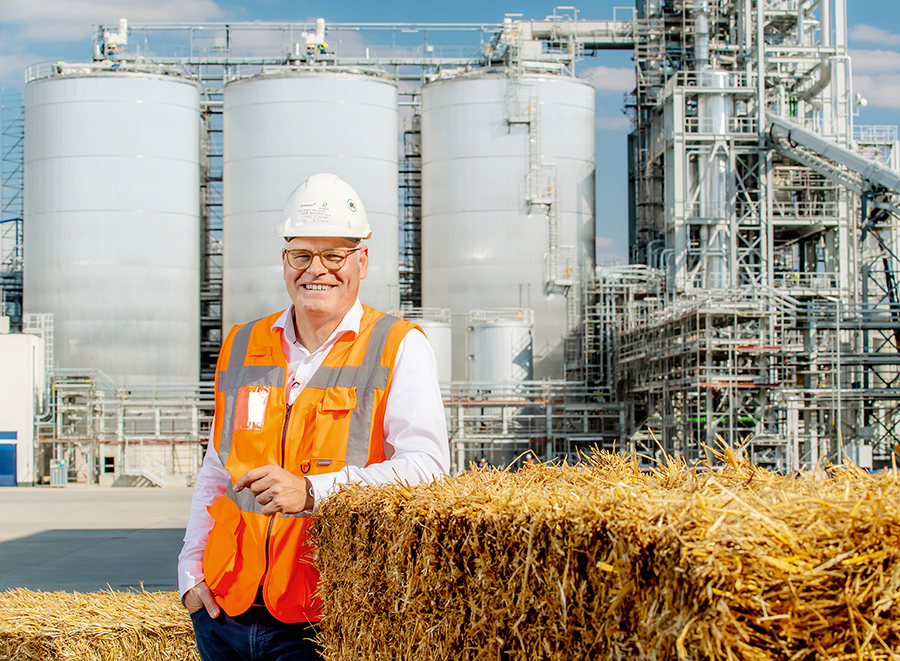Ready for business
How Clariant is laying the ground for second-generation biofuels and much more
The new sunliquid™ plant is ready to start production in Romania. It is the nucleus for a new sustainable business ecosystem. What went into building it?

It was a feeling of déjà vu for Thomas Hoppe. Ten years ago, he had overseen the construction and commissioning of the world’s first pre-commercial sunliquid™ plant in Straubing, Germany. Then, in 2018, he was doing it all again – only about 700 miles farther southeast and at a vastly larger scale.
Hoppe is the Head of Operations for Clariant’s Business Line Biofuels & Derivatives. The facility in Podari, Romania will turn about 250 000 tons of straw into 50 000 tons of sustainable bioethanol each year. It uses the sunliquid™ process developed by Clariant and thoroughly tested at the smaller facility in Germany. »The plant in Straubing was the first of its kind, the one in Podari is the first at commercial scale,« is how Hoppe puts it. The investment is part of LIGNOFLAG and FP7 sunliquid, two EU-funded projects to generate cellulosic ethanol from agricultural residues1. It marks a new era for sustainable fuels and impacts the industry far beyond Romania.

»We’re proud of the fact that we did not lose a single
day to COVID-19 and just celebrated two million work
hours without a lost time accident. All thanks to our
well-established safety protocols.«Thomas Hoppe
Head of Operations, Business Line Biofuels & Derivatives
From residue to value
Clariant’s groundbreaking technology is based on enzymes that turn indigestible cellulose and hemicellulose contained in agricultural residues such as wheat straw or corn stover into sugars that are then fermented into alcohol. The five-step process involves state-of-the-art biotechnology and both a tailored mixture of enzymes and optimized microorganisms. »It’s important to understand that we take residues local farmers aren’t using and turn them into sustainable fuel which is in high demand.« (For more about the sunliquid™ technology, watch our video here). That is because using ethanol to fuel cars is a quick and very effective way of reducing greenhouse gas emissions. »No need for new cars, new gas pumps, or other infrastructure – you simply add it to conventional fuel to make it much more climate-friendly,« Hoppe says. sunliquid™ ethanol itself significantly reduces up to 95 percent of CO2 compared to fossil fuels and by as much as 120 percent if carbon sequestration is considered and used as part of the production process.
Construction in Podari, in the south-west of Romania, began in late 2019 and took two years as planned. »We’re proud of the fact that we did not lose a single day to COVID-19 and just celebrated two million work hours without a lost time accident. All thanks to our well-established safety protocols,« Hoppe says. With the construction phase and much of the installations completed, the plant is now in the process of so-called cold and hot commissioning: from running water through all the pipes to check for leaks to calibrating measuring devices. »We’ve been testing and running trial operations for individual processes since mid-2021,« Hoppe says. Much of that happens in parallel, and it is hard to pinpoint the exact moment when the plant starts up. »You can think of the facility as gradually moving towards full operation,« Hoppe explains.
Building an ecosystem
To get to this point, the Clariant team had to build a lot more than what meets the eye. »We established an entirely new supply chain. We hired and trained specialists. And we had to get a wide range of local stakeholders on board,« says Dragos Gavriluta, Project Director for sunliquid™ Romania and Clariant’s Country Manager for Romania. Gavriluta is a Romanian national. However, 20 years ago, with his economics degree in hand, he left his home country to build a career with Clariant in Canada and the USA. »When they approached me in 2017 about consulting for the sunliquid™ project in Podari, I didn’t know much about the technology,« he remembers. He took the plunge anyway and moved back to Romania with his wife and daughter. »Like so many of my generation, who’ve left home, I was drawn by the opportunity to help build something big and innovative in today's Romania.«

»We established an entirely new supply chain.
We hired and trained specialists.
And we had to get a wide range of local stakeholders on board.«Dragos Gavriluta
Project Director for sunliquid™ Romania, Business Line Biofuels & Derivatives
First, however, he had to contend with Romanian bureaucracy. With such an entirely new technology, there was also no reference, no playbook to follow. Gavriluta and his team prevailed. They got not just the necessary permits but also the backing of the local community. Town hall meetings, open house events, and a regular newsletter helped keep stakeholders informed. »We’re bringing jobs, and we support the local school and medical services. In a town of fewer than 7 000 people, we make a real difference,« Gavriluta says.
New jobs and opportunities
When it came to finding trained professionals, Gavriluta and Hoppe turned to nearby Craiova, Romania’s sixth-largest city. It is home to two universities and has a strong tradition in chemicals and manufacturing. »For any biotechnological production, your best bet is to hire people with experience in fermentation,« Hoppe explains. He himself has a background in brewing and Clariant found similarly skilled workers in the region. »But our specific process is brand new. So we then trained our operators at the pre-commercial facility in Straubing,« says Hoppe.
Another challenge was to build a new supply chain from the ground up. The sunliquid™ plant relies on a steady supply of straw. Podari was chosen among 20 locations in Central and Eastern Europe precisely because of its vast supply of wheat straw. »In Romania, straw is an underutilized resource,« Gavriluta explains. So Hoppes and Gavrilutas feedstock supply team literally went from farm to farm to explain their business proposal. In the end, they got 300 local farmers on board to supply the necessary straw bales. However, with harvest season stretching only a few weeks in the fall, the whole year’s supply needs to be collected in a short window. »Right now, we still have to hire professional balers from outside Romania to get the straw off the fields and into our storage facility,« Gavriluta explains. »In the long-term, our demand will create business opportunities for locals to harvest, bale, and transport our straw.«
»The sunliquid™ technology is a game changer for advanced biofuels. And our plant in Podari will be the greatest proof yet. I am very inspired by the high level of commitment and tremendous teamwork – our ambitious milestones have all been reached so far. Key to our success was our strong leadership and excellent management support.«
Bernd Hirschberg
Project Director, Business Line Biofuels & Derivatives

For Romania, Europe and beyond
Clariant’s project also included setting up a power plant that runs on by-products from the sunliquid™ process. Leftover lignin, the organic polymer that gives structure to plant stalks and wood, will be used to fuel a new combined heat and power (CHP) plant on-site, operated by Clariant’s partner GETEC. That makes the sunliquid™ plant almost energy self-sufficient and shrinks the climate footprint of the whole project even further. Another by-product is the organic residue left from distilling the ethanol. This so-called »vinasse« is rich in minerals and other nutrients. Local farmers will use it either as an organic fertilizer or to produce biogas. »It’s a beautiful example of circular economy,« Gavriluta says. He is proud to be at the heart of it. »Romania has tremendous potential as a producer of advanced biofuels not just for the region, but for other countries as well. We are excited to prove the viability of Clariant’s technology.«
_________________________________________________________________________
1 The project receives funding from the European Union's Seventh Framework Program for research, technological development and demonstration under Grant Agreement no. 322386 (SUNLIQUID) and from the Bio-Based Industries Joint Undertaking under the European Union's Horizon 2020 research and innovation program under Grant Agreement no. 709606 (LIGNOFLAG).

